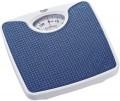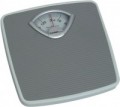The material from which the working surface of the scales is made is
a platform or a bowl.
—
Plastic. An economical and highly functional material applicable to all scale types is plastic. Contrary to misconceptions, plastic can exhibit impressive durability; it's even employed for manufacturing floor scale platforms that accommodate 150 kg or more. Plastic scales offer practical advantages, such as not causing discomfort from coldness against the skin—this makes stepping onto such scales, including barefoot, a comfortable experience. This attribute is particularly valuable for
children's models(refer to "Type of scales"), adding to their overall appeal.
—
Metal. The metal is highly durable and gives the device a solid appearance. On the other hand, it costs more than plastic, and the mentioned advantages in the case of scales are rarely significant. Therefore, this material is used mainly in rather expensive scales. And in low-cost models, “metal” can mean a thin metal coating applied to a plastic platform.
—
Glass. The main feature of glass surfaces can be called a stylish appearance. Glass is not without reason considered fragile, however, to break it, you need a fairly strong blow. And the strength of modern glasses is enough even for floor scales with a weight limit of more
...than 100 kg. Another advantage of this material can be called ease of cleaning.
— Wood. Wooden platforms offer a distinctive and appealing appearance, characterized by unique colors and surface patterns. This choice is particularly favored by those who appreciate natural materials and the eco-friendly style. However, wood lacks significant practical advantages over materials like plastic, and it often comes at a higher cost. Consequently, wooden scales are primarily utilized for aesthetic considerations, resulting in relatively limited availability in the market.
— Rubber. Rubber is predominantly present in two categories of scales, namely pocket and floor scales (as mentioned earlier). In pocket models, the platform pertains to the lower part of the device that comes into contact with the hand during weighing. Rubber, known for its soft and comfortable properties, is a favored material for this type of application, making it highly popular in pocket scales. Similarly, in floor scales, rubber platforms are chosen for comparable reasons. Rubber's softer texture, reduced slipperiness, and enhanced comfort when standing make it preferable to hard plastic. Additionally, rubber platforms can incorporate massage protrusions (pimples), which could be uncomfortable on rigid plastic surfaces. Despite these advantages, the higher cost of rubber makes it less prevalent compared to other materials.
In addition to those described above, modern scales can also use other materials, sometimes quite unusual — for example, marble or stone (including in the form of a mosaic with which the platform is lined), or leather (leatherette). Most often, such materials are used for aesthetic reasons.
